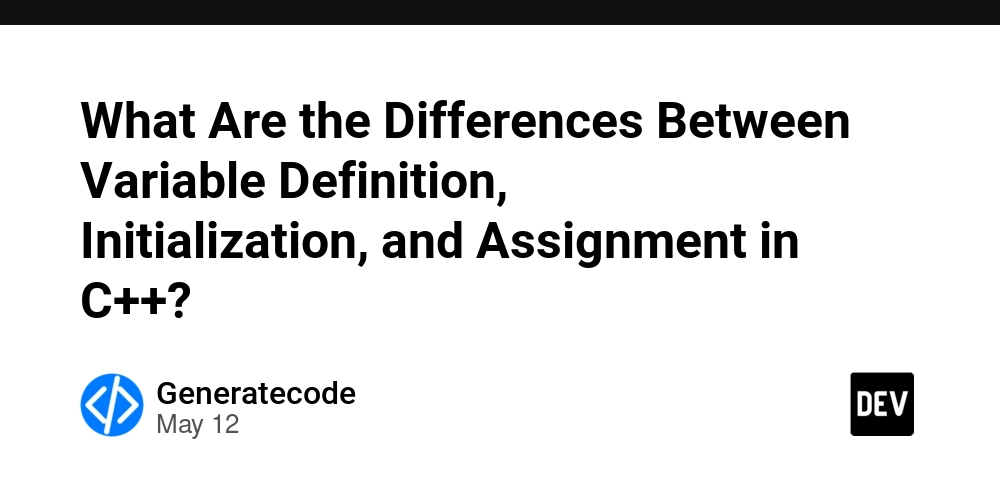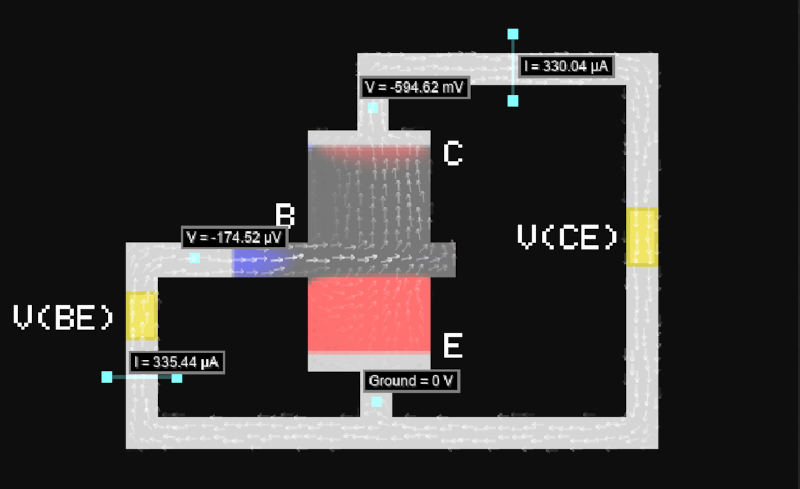What Are the Differences Between Variable Definition, Initialization, and Assignment in C++?
When reading discussions about C++ variable definitions and their associated rules, it’s essential to understand the distinctions between variable definition, initialization, and assignment. Each concept plays a crucial role in how variables behave within C++ code, and knowing these differences can significantly enhance your programming efficiency. Let's delve deeper into variables in C++ and clarify these terms with examples. Understanding Variable Definition In C++, variable definition is the process of declaring a variable to let the compiler know the variable’s type and its name. For instance: int x; // Variable definition Here, int x; tells the compiler to reserve space in memory for an integer variable named x. However, at this point, x does not hold any value; it’s simply defined. What is Variable Initialization? Initialization refers to the process of assigning a value to a variable at the time of its definition. This is crucial because an uninitialized variable may contain garbage values if used before assignment. Here’s an example of variable initialization: int y = 10; // Variable initialization int z{20}; // Using uniform initialization Both y and z are defined and initialized, meaning they now contain values right after their declarations. The way of initializing using curly braces ({}) is known as uniform initialization, introduced in C++11, and it helps to avoid certain issues with narrow conversions or unintentional type deductions. Understanding Assignment Assignment is distinct from both definition and initialization. It's the process of setting a value to an already defined variable. For example: int foo; // Definition foo = 10; // Assignment This snippet defines foo first without assigning it a value and later assigns the value 10 to foo. It’s essential to understand that assignment can only occur after a variable has been defined. The Rules of C++ Scope and Switch Case The confusion around variable declaration and initialization can often arise in complex structures such as switch statements. Consider the code provided: switch (1) { int a; // okay: definition is allowed before case labels int b{ 5 }; // illegal: initialization is not allowed before case labels case 1: int y; // okay but bad practice: definition allowed within a case y = 4; // okay: assignment is allowed break; case 2: int z{ 4 }; // illegal: initialization is not allowed if subsequent cases exist y = 5; // okay: y was declared above, so we can use it here too break; case 3: break; } In this structure, you can declare a variable before the case labels (int a;), but initialization (like int b{5};) is not allowed because it could cause confusion due to scope rules. The specification aims to avoid potential misunderstandings where initializations might be skipped due to case fallthrough. Why the Restrictions? The rule against initializing variables before the case labels is primarily for maintainability and clarity. If initialization were allowed, it could lead to scenarios where the programmer mistakenly believes their variable has been set in all cases, while in fact, it may only have been initialized in a specific case due to how C++ handles variable scopes. Summary of Definitions, Initializations, and Assignments To recap, here are the core differences: Definition: Telling the compiler about a variable's type and reserving memory for it. Initialization: Assigning a value to a variable at the time it’s created—this can create problems with scope if misused. Assignment: Giving a value to an already defined variable after its declaration. Frequently Asked Questions Can I define and initialize a variable in the same statement? Yes, you can define and initialize a variable in one line, using either = or {} for initializer lists. Why is uniform initialization preferred? Uniform initialization using curly braces prevents common pitfalls associated with type narrowing and potential initialization problems. What happens if I use an uninitialized variable? Using an uninitialized variable can lead to unpredictable results since it may contain garbage values that were left in its memory location. Conclusion Understanding the differences between variable definition, initialization, and assignment is key to writing clear and effective C++ programs. As you practice, you'll find that these concepts become second nature, allowing you to write better, more maintainable code. Always remember the scope rules, especially when dealing with complex control structures like switch statements, to avoid unexpected behaviors in your programs.

When reading discussions about C++ variable definitions and their associated rules, it’s essential to understand the distinctions between variable definition, initialization, and assignment. Each concept plays a crucial role in how variables behave within C++ code, and knowing these differences can significantly enhance your programming efficiency. Let's delve deeper into variables in C++ and clarify these terms with examples.
Understanding Variable Definition
In C++, variable definition is the process of declaring a variable to let the compiler know the variable’s type and its name. For instance:
int x; // Variable definition
Here, int x; tells the compiler to reserve space in memory for an integer variable named x. However, at this point, x does not hold any value; it’s simply defined.
What is Variable Initialization?
Initialization refers to the process of assigning a value to a variable at the time of its definition. This is crucial because an uninitialized variable may contain garbage values if used before assignment. Here’s an example of variable initialization:
int y = 10; // Variable initialization
int z{20}; // Using uniform initialization
Both y and z are defined and initialized, meaning they now contain values right after their declarations. The way of initializing using curly braces ({}) is known as uniform initialization, introduced in C++11, and it helps to avoid certain issues with narrow conversions or unintentional type deductions.
Understanding Assignment
Assignment is distinct from both definition and initialization. It's the process of setting a value to an already defined variable. For example:
int foo; // Definition
foo = 10; // Assignment
This snippet defines foo first without assigning it a value and later assigns the value 10 to foo. It’s essential to understand that assignment can only occur after a variable has been defined.
The Rules of C++ Scope and Switch Case
The confusion around variable declaration and initialization can often arise in complex structures such as switch statements. Consider the code provided:
switch (1) {
int a; // okay: definition is allowed before case labels
int b{ 5 }; // illegal: initialization is not allowed before case labels
case 1:
int y; // okay but bad practice: definition allowed within a case
y = 4; // okay: assignment is allowed
break;
case 2:
int z{ 4 }; // illegal: initialization is not allowed if subsequent cases exist
y = 5; // okay: y was declared above, so we can use it here too
break;
case 3:
break;
}
In this structure, you can declare a variable before the case labels (int a;), but initialization (like int b{5};) is not allowed because it could cause confusion due to scope rules. The specification aims to avoid potential misunderstandings where initializations might be skipped due to case fallthrough.
Why the Restrictions?
The rule against initializing variables before the case labels is primarily for maintainability and clarity. If initialization were allowed, it could lead to scenarios where the programmer mistakenly believes their variable has been set in all cases, while in fact, it may only have been initialized in a specific case due to how C++ handles variable scopes.
Summary of Definitions, Initializations, and Assignments
To recap, here are the core differences:
- Definition: Telling the compiler about a variable's type and reserving memory for it.
- Initialization: Assigning a value to a variable at the time it’s created—this can create problems with scope if misused.
- Assignment: Giving a value to an already defined variable after its declaration.
Frequently Asked Questions
Can I define and initialize a variable in the same statement?
Yes, you can define and initialize a variable in one line, using either = or {} for initializer lists.
Why is uniform initialization preferred?
Uniform initialization using curly braces prevents common pitfalls associated with type narrowing and potential initialization problems.
What happens if I use an uninitialized variable?
Using an uninitialized variable can lead to unpredictable results since it may contain garbage values that were left in its memory location.
Conclusion
Understanding the differences between variable definition, initialization, and assignment is key to writing clear and effective C++ programs. As you practice, you'll find that these concepts become second nature, allowing you to write better, more maintainable code. Always remember the scope rules, especially when dealing with complex control structures like switch statements, to avoid unexpected behaviors in your programs.
_Piotr_Adamowicz_Alamy.jpg?width=1280&auto=webp&quality=80&disable=upscale#)








































































![Apple Officially Releases macOS Sequoia 15.5 [Download]](https://www.iclarified.com/images/news/97308/97308/97308-640.jpg)



















































































































_designer491_Alamy.jpg?width=1280&auto=webp&quality=80&disable=upscale#)






















































































































































































































































































![Ditching a Microsoft Job to Enter Startup Purgatory with Lonewolf Engineer Sam Crombie [Podcast #171]](https://cdn.hashnode.com/res/hashnode/image/upload/v1746753508177/0cd57f66-fdb0-4972-b285-1443a7db39fc.png?#)































































































